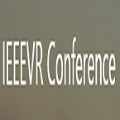Generative AI tools can provide people with the ability to create virtual environments and scenes with natural language prompts. Yet, how people will formulate such prompts is unclear -- particularly when they inhabit the environment that they are designing. For instance, it is likely that a person might say, "Put a chair here", while pointing at a location. If such linguistic features are common to people's prompts, we need to tune models to accommodate them. In this work, we present a wizard-of-oz elicitation study with 22 participants, where we studied people's implicit expectations when verbally prompting such programming agents to create interactive VR scenes. Our findings show that people prompt with several implicit expectations: (1) that agents have an embodied knowledge of the environment; (2) that agents understand embodied prompts by users; (3) that the agents can recall previous states of the scene and the conversation, and that (4) agents have a commonsense understanding of objects in the scene. Further, we found that participants prompt differently when they are prompting in situ (i.e. within the VR environment) versus ex situ (i.e. viewing the VR environment from the outside). To explore how our could be applied, we designed and built Oastaad, a conversational programming agent that allows non-programmers to design interactive VR experiences that they inhabit. Based on these explorations, we outline new opportunities and challenges for conversational programming agents that create VR environments.
翻译:暂无翻译



